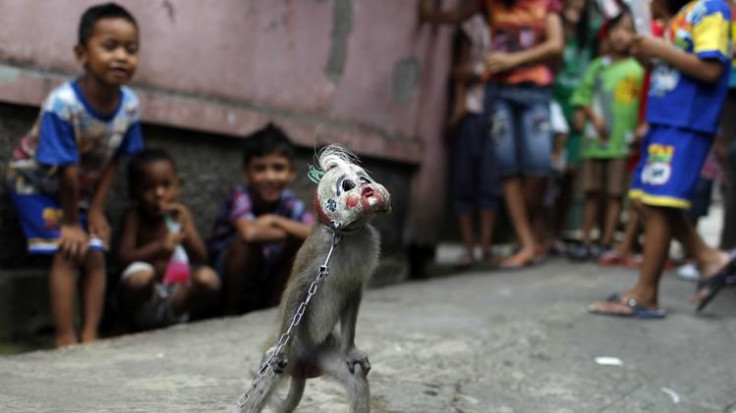Masked Monkey Shows To Be Banned In Jakarta, ‘Topeng Monyet’ Macaques Are ‘Riddled With Parasites’ [PHOTOS]

Masked monkey shows in Indonesia’s capital will be banned by next year, according to a recent decision by Governor Joko “Jokowi” Widodo.
Indonesian authorities plan on confiscating the monkeys that perform in the masked shows, known as “Topeng Monyet.” They will be bought back for about $90 each and sheltered at Jakarta's Ragunan Zoo, the Associated Press reports.
“We are very happy with this decision because we have been fighting against this practice since 2009,” Femke den Haas, Jakarta Animal Aid Network founder, told the Jakarta Post.
The street monkeys which are dressed up and forced to perform for crowds on Jakarta’s busy streets are often abused and exploited. The masked monkeys also pose certain health risks since they have been known to carry diseases including tuberculosis, hepatitis and the bacterial disease, leptospirosis.
"The monkeys live in pitiful conditions, are riddled with parasites and forced to live in small cages," Den Haas told the BBC.
The monkeys are often captured in forests by poachers, which are then sold for about $2 to $7. The street monkeys are usually kept on short chains to teach them to walk on two legs like humans. As the monkeys grow, the metal chains eventually infect their skin and lead to infections, according to JAAN.
"Frequently their teeth are cut out, they are often starved and made to hang upside down for prolonged periods,” Den Haas said describing how the monkeys are tortured to remain obedient.
Animal rights groups have been campaigning to end the masked money shows. In 2012, with permission from city officials, JAAN confiscated 40 monkeys that were found to have diseases like tuberculosis and hepatitis.
"They are all traumatized and require at least three months in quarantine before we can even contemplate re-releasing them into the wild - and even then it has to be in an area where there no other wild monkeys," Den Haas said describing how the animals could no defend themselves in the wild.
The monkeys are trained in a city slum nicknamed “monkey village” where street children are coerced into becoming their handlers.
“Last year, in a housing complex in Prumpung, East Jakarta, many handlers and monkeys lived in dense and dirty neighborhoods. We found that some people had contracted TB from their monkeys,” Pramudya Harzani, JAAN’s advisory board member, said.
Widodo, who recently announced the rescue effort, said the monkeys will be start being confiscated soon due to the growing health risks the monkeys pose.
"That is related to order on the streets as well as rabies and other sorts of diseases, that is why we want to be free of performing monkeys and why we have started this week," Widodo told local media on Monday. "The exploitation of monkeys for performances has become an international issue and the city administration will act immediately to save them."
© Copyright IBTimes 2024. All rights reserved.






















